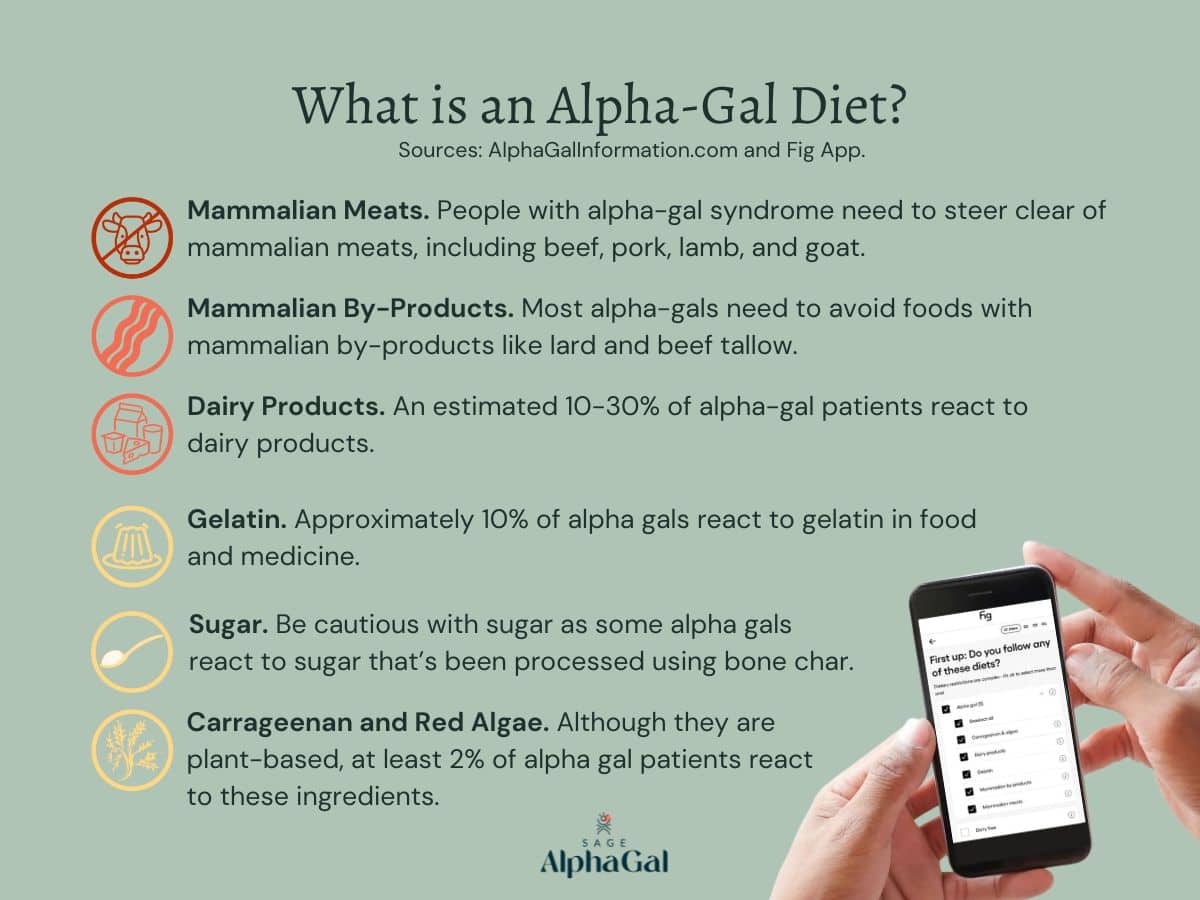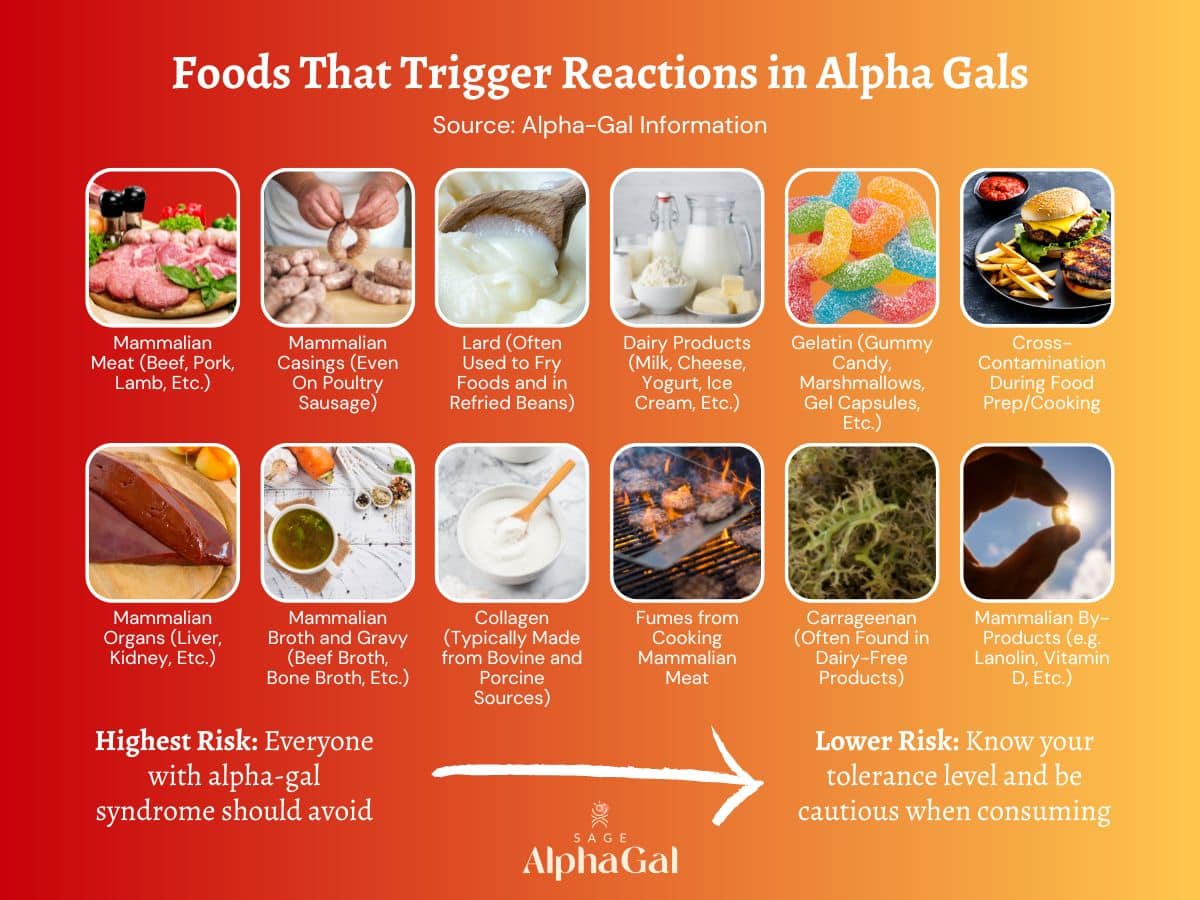Definitions for common words associated with alpha-gal syndrome, a tick-borne red meat allergy. The list includes terms related to alpha-gal allergy triggers, ingredients to keep in mind when following an alpha-gal diet, and other things you need to know when living with alpha-gal syndrome.
Are you looking for something that’s not on this list?
Allergic Reaction
An allergic reaction is your body’s way of saying, ‘I don’t like this!’ It happens when your immune system reacts to a substance it doesn’t like, such as pollen, pet dander, or certain foods. Symptoms can range from mild, like itching or sneezing, to severe, like anaphylaxis.
Allergist
An allergist is a physician who specializes in diagnosing and treating conditions that mess with your immune system. Whether you’re dealing with allergies, asthma, or even more complex immune disorders, an allergist is your go-to expert. They can run tests to figure out what’s triggering your symptoms, prescribe medications to manage them, and even offer lifestyle changes to help you avoid those triggers. For someone with alpha-gal syndrome, an allergist can be a crucial ally in managing your condition effectively.

Alpha-Gal Diet
An alpha-gal diet or an alpha-gal allergy diet is a specialized diet eliminates all mammalian meats — such as beef, pork, lamb, bison, and venison — as well as other mammalian-derived ingredients known to trigger reactions in alpha-gal patients. It’s important to note that alpha-gal syndrome varies from person to person. Because not everyone with alpha-gal syndrome will react to the same secondary triggers, and alpha-gal diet will vary by individual.
Alpha-Gal Panel
The alpha-gal panel is the ultimate test to confirm if you’re part of the alpha-gal club. It’s a blood test that measures your levels of alpha-gal antibodies. A result above 0.1 means you’ve got alpha-gal syndrome. Always consult with a healthcare professional for diagnosis and treatment.
Alpha-Gal Epitope
The alpha-gal epitope is a special sugar tag found on the outside of cells in mammals like cows and pigs. Humans don’t have this sugar tag, so our bodies make a “security guard” called anti-Gal to spot it. If we are bitten by certain ticks and then eat meat from mammals, the “security guard” notices this sugar tag and can cause an allergic reaction. This is why some people have alpha-gal syndrome, which makes them allergic to red meat.
Alpha-Gal Safe Foods
A term to describe foods that are generally considered safe for those with alpha-gal syndrome. This list includes:
- fruits
- vegetables
- beans, lentils, and legumes
- nuts and seeds
- grains
- eggs
- poultry
- fish and seafood
Alpha-Gal Syndrome
Alpha-gal syndrome (AGS) is a tick-borne allergy to red meat and other mammal-derived products. In the United States, the culprit behind this condition is the lone star tick. When this little blood sucker bites you, it injects a sugar molecule called alpha-gal into your system. For some, this sets off an immune system alarm that can range from hives and itching to a full-blown, life-threatening reaction known as anaphylaxis.
Anaphylaxis
Anaphylaxis is your body’s red-alert response to an allergen, and it’s as serious as a heart attack—literally. It can cause difficulty breathing, a rapid drop in blood pressure, and even loss of consciousness. If this happens, grab that EpiPen or Auvi-Q and use it. Then, be sure to seek medical attention, even if you’re feeling better.
Antihistamine
Antihistamines act like the bouncers at Club Immune System. They block histamine, a chemical your body releases during an allergic reaction. While they can’t kick allergens out of the club, they can definitely make your stay more comfortable by reducing symptoms like itching and sneezing.
Auvi-Q
Auvi-Q is a tech-savvy alternative to an EpiPen. It’s an auto-injector that delivers a dose of epinephrine to treat severe allergic reactions, just like an EpiPen. But here’s the cool part: Auvi-Q comes with an electronic voice instruction system to guide you through each step of the injection. It’s designed for both adults and children who weigh at least 16.5 pounds. After using Auvi-Q, you’ll need to seek emergency medical attention for further treatment and observation, just like with an EpiPen.
Beans
Beans are the edible seeds of certain plants including black beans, kidney beans, and chickpeas. They are high in fiber and are a good plant-based source of protein.
Bone Char
A substance made from animal bones (usually cows) that is often used to whiten cane sugar. While not all alpha-gal patients react to sugar processed this way, if you have alpha-gal syndrome, you may want to opt for an alternative sweetener. Beet sugar, coconut sugar, organic sugar, unrefined sugar, honey, agave syrup, and maple syrup are all alpha-gal friendly alternatives.
Carnauba Wax
Carnauba wax is a natural wax derived from the leaves of the Brazilian palm tree Copernicia prunifera. It is commonly used as a food glaze, but can also be found in some cosmetics and pharmaceuticals. Carnauba wax is also known as Brazil wax or palm wax.
Carrageenan
Carrageenan is a plant-based thickening and gelling agent extracted from red seaweed. Also known as Irish moss, carrageenan is often used in vegan versions of cheese, yogurt, and chocolate milk. Unfortunately for alpha-gals, this plant-based ingredient contains the alpha-gal epitope. That’s right, even though it’s plant-based, carrageenan can still trigger a reaction in some people with alpha-gal syndrome.
Casein
Casein is a major protein found in milk. It’s known for its slow-digesting properties, providing a steady release of amino acids over a period of time. Casein is often used in protein supplements and a variety of food products.
Complete Protein
Complete proteins include all nine essential amino acids that the human body cannot make on its own. Examples of complete proteins that are alpha-gal friendly include chicken, fish, and eggs, as well as plant-based sources like quinoa, tofu, and chia seeds.
Confectioner's Glaze
Confectioner’s glaze is a clear, glossy, tasteless coating that is commonly used to give candies, chocolates, and other confectionery goods a shiny finish. It is derived from the secretions of the female lac bug found in Asia. The glaze is typically mixed with alcohol to create a thin, liquid coating. Once the glaze is dry, it forms a hard, protective layer that helps to preserve the freshness and flavor of the product. Because confectioner’s glaze is derived from an insect — and not a mammal — it is an alpha-gal friendly ingredient. But because insects are animals, it is not vegan-friendly.
Cross-Contamination
Cross-contamination occurs when allergens from one food or surface come into contact with another food. It’s the food version of “you got your peanut butter in my chocolate,” but with potentially serious consequences.
Dairy Free Baking
Dairy free baking involves making baked goods without dairy products like milk, butter, and cream. It uses plant-based alternatives such as almond, soy, oat milk, vegan butter, and coconut oil. The key to successful dairy free baking is choosing the right substitutes to maintain the desired taste and texture. While it may require some experimentation, dairy-free baking allows individuals with dietary restrictions like alpha-gal syndrome to enjoy a wide range of delicious treats without compromising on flavor or quality.
DEET
DEET is a chemical that you can put on your skin or clothes to keep ticks, mosquitoes, and other pesky critters away. It’s super effective and has been around since the 1940s, but some people find that it irritates their skin or eyes. So, if you’re planning a day out in tick territory, DEET can help prevent tick bites, but make sure to read the instructions carefully and use the insect repellent only as directed.
Delayed Reaction
Alpha-gal reactions often occur several hours after exposure, which is unusual for food allergies.
Elimination Diet
An elimination diet involves removing specific foods or ingredients from your diet to see if you have an allergic reaction or sensitivity to them. Think of it as detective work for your digestive system.
Epinephrine
EpiPen
An EpiPen is a specific brand of epinephrine auto-injector. It’s a medical device that delivers a dose of epinephrine to treat severe allergic reactions, like anaphylaxis. The EpiPen is designed to be user-friendly. You inject it into the middle of your outer thigh, even through clothing if necessary. It’s crucial to call 911 or head to the nearest emergency room right after using it, even if you start to feel better. EpiPens come in two strengths based on body weight. They’re typically sold in sets of two, just in case a second dose is needed.
Food Allergy
A food allergy is when your immune system says “nope” to certain foods. It treats these foods like harmful invaders and fights back with symptoms that range from itching and hives to anaphylaxis. People with alpha-gal syndrome are allergic to mammalian meats like beef, pork, and lamb. Additionally, some alpha-gals are also allergic to dairy products and other ingredients derived from mammals like collagen, gelatin, and lard.
Food Challenge
A food challenge is a medical test where a patient is given small but increasing amounts of a specific food under medical supervision to see if it triggers an allergic reaction. For people with alpha-gal syndrome, a food challenge can help pinpoint specific triggers and assess sensitivity levels. It’s crucial to only do this under the guidance of healthcare professionals.
Food Diary
A food diary is your personal culinary detective notebook. It’s where you jot down everything you eat and drink throughout the day. This helps you understand your alpha-gal sensitivities and the foods that trigger reactions. By tracking what you consume, you can pinpoint specific foods, ingredients, and medications that might be causing allergic reactions.
Sage Advice: This free download is a food diary and trigger tracker designed specifically for people with alpha-gal syndrome.
Food Labels
Food labels provide information about the nutritional content of a food item. They’re like the food’s resume, listing its skills (nutrients) and experience (ingredients). When you have a food allergy like alpha-gal, knowing how to read a nutrition label is very important.
Gelatin
Gelatin is a translucent, colorless, and flavorless substance commonly found in everything from marshmallows to gummy bears. It’s also found in medications, cosmetics, and even photographic films. Unfortunately for us alpha-gals, it’s typically derived from collagen found in animal body parts — mostly pigs and cows. So you’ll want to look for alternative products that use fish geltain, fruit pectin, or another plant-based alternative.
Hidden Allergens
Hidden allergens are substances that can cause allergic reactions but aren’t obvious or directly listed in ingredient lists. Here are some hidden allergens to watch for when you have alpha-gal syndrome:
- Foods made with marshmallows which often contain gelatin
- Plant-based milks that contain carrageenan
- Pie crust, biscuits, or other baked goods made with lard
- Beer, wine, and spirits which may be clarified with gelatin
Histamine
Histamine is like your body’s flare gun, signaling that something’s wrong. It’s released during injuries or allergic reactions and causes muscles to contract and blood vessels to widen. It’s the reason you get symptoms like itching or sneezing.
Immunoglobulin E (IgE)
Immunoglobulin E (IgE) is a type of antibody that sounds the alarm when allergens enter your system, triggering an allergic reaction. In the context of alpha-gal syndrome, an alpha-gal IgE level greater than 0.1 is generally considered a positive result. A blood test is a key diagnostic tool, and a result above 0.1 confirms you’re part of the alpha-gal club. If you suspect you might have alpha-gal syndrome, talk to your healthcare professional to order a test and discuss your results.
Incomplete Protein
Unlike a complete protein, an incomplete protein lacks one or more essential amino acids. Incomplete proteins are typically derived from plant sources and include beans, nuts, seeds, whole grains, and vegetables. (However, quinoa, soybeans, hempseed, and chia seeds are plant-based examples of complete proteins.)
Incomplete proteins can be combined with other protein sources to create a complete protein. A few delicious examples are:
- Nut butter on whole wheat bread
- Beans and rice
- Hummus and pita bread
Lecithin
Lecithin is a fatty substance often used as an emulsifier in foods like chocolate and salad dressings. It’s the peacemaker that helps oil and water get along in your food. While it’s commonly sourced from soy or sunflower, it can also be derived from animal tissues.
Legumes
Legumes are a type of plant. Examples of legumes include beans, lentils, peas, and peanuts. They are high in fiber and are a good source of plant-based protein.

Lone Star Tick
The lone star tick is the villain in the alpha-gal syndrome story. Mainly found in the southern, central, and eastern United States, this tiny bloodsucker is the main culprit behind this tick-borne illness. The adult female lone star tick has a single white spot on her back, making her easy to identify but not any less annoying.
Magnesium Stearate
Magnesium stearate is a white, powdery substance often used as a “flow agent” in the manufacturing of pills and capsules. It’s like the traffic cop of the supplement world, ensuring that everything moves smoothly down the production line. Magnesium stearate can be derived from either plants or animals, typically cows or pigs. If you have alpha-gal, you’ll want to be sure anything you consume with this ingredient comes from a plant-based source.
Mammalian By-Products
These are non-meat items derived from animals like cows, pigs, and sheep. Common examples include lard, gelatin, and tallow. If you have alpha-gal syndrome, you’ll want to steer clear of these ingredients. Plant-based alternatives like olive oil and peanut oil can be good substitutes.
Mast Cell
Mast cells are like the gossipmongers of your immune system. They release chemicals like histamine during an allergic reaction, spreading the news that an allergen invader has been spotted.
Mast Cell Activated Syndrome (MCAS)
MCAS is an immunological condition where your body’s mast cells go a little overboard. Instead of just releasing chemicals to fight off infections or allergens, they release an excessive amount of mediators like histamine, causing a wide range of symptoms. These can include anything from skin issues like hives to gastrointestinal problems and even anaphylaxis. MCAS can be triggered by various factors, including infections, medications, and even stress. Diagnosis often involves identifying elevated levels of mast cell mediators and observing symptom improvement with specific medications.
Meal Planning
Meal planning involves organizing meals and snacks for a specific period. It’s like being the project manager for your stomach, ensuring that everything runs on time and meets your nutritional and dietary needs.
Permethrin
Permethrin is a synthetic chemical used in insecticides. It’s a synthetic chemical that you can spray on your clothes, tent, sleeping bag, and other gear to make you practically invisible to ticks, mosquitoes, and other insects while you’re enjoying the great outdoors.
Unlike DEET, you don’t put permethrin directly on your skin. When bugs come into contact with something treated with permethrin, they get confused, can’t move properly, and eventually die. It’s super effective and can last for several washes, depending on the brand. Just remember, it’s for your clothes, and not your skin!
Pescatarian or Pescetarian
Whether you spell it with an “a” or an “e” a pescetarian diet includes fish and seafood but excludes other meats. It’s the middle ground between vegetarianism and a full omnivorous diet.
Picaridin
Picaridin is a synthetic compound that you can apply directly to your skin or clothes to repel bugs like mosquitoes, ticks, and fleas. Unlike its older cousin DEET, picaridin doesn’t have a strong smell and won’t melt your favorite plastic sunglasses. It’s been popular in Europe and Australia for a while and made its American debut in 2005. Studies have shown that it’s just as effective as DEET, without the greasiness or the strong odor. So, if you’re looking for a modern, user-friendly way to fend off ticks and other bugs, picaridin might just be your new best friend!
Plant-Based Alternatives
These are non-animal substitutes often used in cooking and baking. Popular examples include almond milk instead of cow’s milk, and vegetable oil instead of lard. For people with alpha-gal syndrome, these alternatives can be a lifesaver, allowing them to enjoy familiar flavors without the risk of an allergic reaction.
Plant-Based Diet
A plant-based diet focuses on foods derived exclusively from plants — including fruits, vegetables, grains, and nuts — rather than animal sources. It’s like being a human herbivore, but with tasty recipe options.
Plant-Based Protein
Quinoa
Quinoa (pronounced keen-wah) is a gluten-free, grain-like crop native to the Andes Mountains in South America. It’s often called a “superfood” because it is a nutritious, plant-based complete protein. Quinoa has a subtle and unique flavor and is easy to cook. Quinoa is delicious in everything from grain bowls to quinoa salads to desserts.
Rennet
Rennet is an enzyme complex that plays a starring role in cheese-making by helping milk coagulate and separate into curds and whey. Traditionally sourced from the stomach lining of ruminant animals, like cows or sheep, it’s best for alpha gals who eat cheese to seek a plant-based alternative.
Safe Foods
Safe foods are the items you can eat without experiencing an allergic reaction.
Tick Bite
A tick bite is a sneak attack from a tiny vampire. It’s how ticks feast on your blood and transmit tick-borne illnesses like alpha-gal syndrome. The best defense is a good offense, so use insect repellent and check yourself for ticks after spending time outdoors.
Tick-Borne Diseases
Tick-borne diseases are illnesses you can get from tick bites. In addition to alpha-gal syndrome, tick-borne illnesses include Lyme disease and Rocky Mountain spotted fever.
Tick Lifecycle
The tick lifecycle consists of four stages: egg, six-legged larva, eight-legged nymph, and adult. Each stage is like a different chapter in the tick’s life, and once a tick hatches from its egg, it must eat blood at every stage to survive.
Tick Repellent
Tick repellent is a substance you can apply to your skin, clothing, or even your yard to keep ticks at bay. And because avoiding additional tick bites is an important way to keep your alpha-gal sensitivity from getting worse, protection is key.
There are different types of tick repellents, including chemical ones like DEET and picaridin, and natural options that use essential oils like lemongrass and peppermint. Some tick repellents can be sprayed onto your lawn, while others are better suited for your skin or clothes. The effectiveness of a tick repellent can vary based on its active ingredients, so always read the label to know how long you’ll be protected.

Trigger Foods
In the world of alpha-gal syndrome, trigger foods are the foods that can set off an allergic reaction. For someone with alpha-gal syndrome, trigger foods are mammalian meats like beef, pork, and lamb. Some alpha gals are also allergic to dairy products, gelatin, and carrageenan. The key to managing these trigger foods is awareness and vigilance. Always read food labels and consult with your allergist to manage your condition.
Vegan
A vegan diet excludes all animal products, including meat, dairy, eggs, and honey.
Vegan Alternatives
Vegan alternatives are plant-based or synthetic options that mimic the taste, texture, and function of animal products. Think almond milk instead of cow’s milk, or jackfruit as a stand-in for pulled pork. For alpha-gals, vegan alternatives can be a lifesaver, but it’s crucial to read labels. Some vegan products may contain ingredients like carrageenan, which could trigger an alpha-gal reaction. So, while these alternatives can make your culinary life more exciting, always double-check the ingredients to ensure they meet your specific needs.
Vegetarian
A vegetarian diet excludes meat but may include other animal products like dairy and eggs. It’s like being vegan-lite.
Vitamin D
Vitamin D helps your body absorb calcium, one of the main building blocks of bone. A lack of vitamin D can lead to bone diseases like osteoporosis or rickets. According to the Harvard School of Public Health, good food sources of vitamin D include:
- Salmon
- Swordfish
- Tuna
- Egg Yolk
- Dairy and plant milks fortified with vitamin D
- Fortified cereals
Whey Protein
Whey protein is a high-quality protein derived from milk during the cheese-making process, and it’s just as likely as cheese to contain rennet. As a result, even alpha gals who can tolerate dairy may want to stay away from whey protein.
Xantham Gum
This common thickening and stabilizing agent derived from fermented sugars is found in many processed foods. Because it is not animal-based, xanthan gum is vegan and generally considered safe for those with alpha-gal syndrome.
Thank you for sharing!
